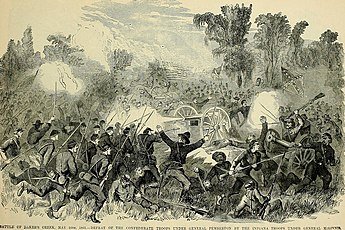The Battle of Champion’s Hill: A Pivotal Moment in the Vicksburg Campaign
On May 16th, 1863, the Battle of Champion’s Hill unfolded as a critical engagement during the American Civil War, marking a pivotal moment in the Vicksburg Campaign. This significant battle, also known as the Battle of Baker’s Creek, proved to be the bloodiest action of the campaign, ultimately shaping the course of history with its far-reaching consequences.
The Context: Vicksburg Campaign and its Significance
The Vicksburg Campaign, a series of maneuvers and battles aimed at capturing the Confederate stronghold of Vicksburg, Mississippi, held immense strategic importance during the Civil War. Vicksburg’s location on the Mississippi River made it a key target for the Union forces, as its capture would not only split the Confederacy in half but also give the Union control over the vital waterway, effectively isolating the western Confederate states from the eastern ones.
General Ulysses S. Grant, leading the Union forces, recognized the strategic significance of Vicksburg and embarked on a campaign to seize the city. The Battle of Champion’s Hill emerged as a crucial juncture in this campaign, with its outcome carrying the potential to tip the scales in favor of either the Union or the Confederacy.
The Battle Unfolds: Union Forces vs. Confederate Troops
On that fateful day of May 16th, 1863, Union forces under the command of Major General Ulysses S. Grant clashed with Confederate troops led by General John C. Pemberton at Champion’s Hill, Mississippi. The rugged terrain and dense vegetation of Champion’s Hill set the stage for a fierce and grueling battle, as both sides were determined to secure victory in this crucial confrontation.
The Union forces, displaying remarkable strategic acumen and unwavering determination, engaged the Confederate troops in a relentless and intense struggle. The ferocity of the combat and the staggering loss of life underscored the high stakes of the battle, with each side fully aware of the pivotal implications of the impending outcome.
The Turning Point: Grant’s Triumph and its Aftermath
Despite the formidable resistance put up by the Confederate troops, the Union forces, under the leadership of General Grant, ultimately emerged triumphant at the Battle of Champion’s Hill. This hard-fought victory proved to be a turning point in the Vicksburg Campaign, as it set the stage for the subsequent siege of Vicksburg.
The Union’s control over Champion’s Hill not only paved the way for the siege of Vicksburg but also had broader strategic ramifications. The decisive outcome of the battle gave the Union forces a significant advantage, ultimately leading to the surrender of Vicksburg on July 4th, 1863. The fall of Vicksburg dealt a severe blow to the Confederacy, effectively cutting off vital supply lines and isolating Confederate forces in the west.
The capture of Vicksburg, made possible in large part by the pivotal victory at Champion’s Hill, marked a turning point in the Civil War. The Union’s control over the Mississippi River dealt a substantial blow to the Confederacy and significantly bolstered the Union’s war efforts.
Historical Significance and Legacy
The Battle of Champion’s Hill stands as a testament to the indomitable spirit and unwavering resolve displayed by both Union and Confederate forces during this pivotal moment in history. The staggering human cost of the battle and its enduring impact on the Vicksburg Campaign underscore its historical significance.
Furthermore, the events that transpired at Champion’s Hill continue to be studied and commemorated as integral components of Civil War history. The battlefield serves as a poignant reminder of the sacrifices made by those who fought and perished in the struggle for Vicksburg, and it stands as a testament to the enduring legacy of the American Civil War.
In conclusion, the Battle of Champion’s Hill, fought on May 16th, 1863, holds a revered place in the annals of American history. Its pivotal role in the Vicksburg Campaign and the broader context of the Civil War underscores its enduring significance, making it a compelling subject of historical study and reflection.

